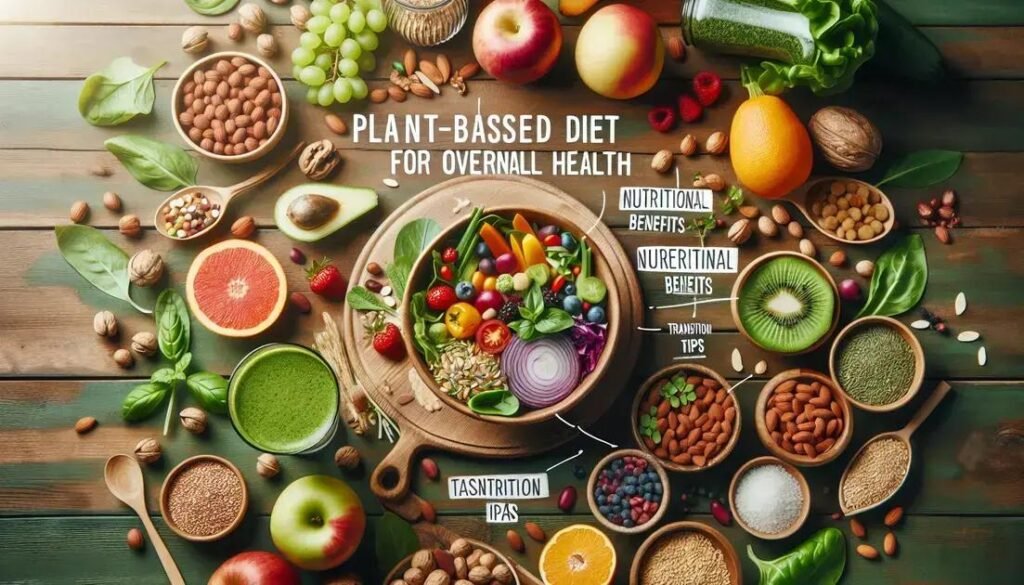Are you ready to transform your health and wellbeing by making a simple yet impactful change to your diet? A plant-based diet has been gaining popularity in recent years, and for good reason.
By incorporating more plant-based foods into your daily meals, you can experience a range of benefits, from weight loss to increased energy levels.
In this article, we’ll explore the benefits of a plant-based diet, provide some easy meal ideas, and debunk common misconceptions about plant-based eating.
Whether you’re a longtime vegan or just starting to explore the world of plant-based living, this guide is for you.
Table of Contents
Benefits of a Plant-Based Diet
A plant-based diet has been shown to have numerous health benefits, including reduced risk of heart disease, type 2 diabetes, and certain types of cancer. A plant-based diet can also help with weight loss and management, improve digestion, and boost energy levels. Additionally, a plant-based diet is rich in vitamins, minerals, and antioxidants, which can help to protect against chronic diseases. With the many benefits of a plant-based diet, it’s no wonder why more and more people are making the switch.
One of the biggest misconceptions about plant-based eating is that it’s complicated and time-consuming. However, with a little creativity and planning, it’s easy to make delicious and nutritious plant-based meals. Here are a few easy plant-based meal ideas to get you started: quinoa bowls with roasted vegetables, lentil soup, vegan stir-fry with tofu, and chickpea salad. You can also find plenty of plant-based recipes online and in cookbooks to inspire your meal planning.
There are many common misconceptions about plant-based diets that can discourage people from trying it out. One of the most common misconceptions is that plant-based diets are protein-deficient. However, many plant-based foods are high in protein, such as beans, lentils, and tofu. Another misconception is that plant-based diets are expensive, but with a little planning and creativity, you can make plant-based meals on a budget. Finally, some people believe that plant-based diets are too restrictive, but with all the variety of plant-based foods available, it’s easy to find something you love.
A plant-based diet is rich in essential nutrients, including vitamins, minerals, and antioxidants. Plant-based foods are also high in fiber, which can help to prevent constipation and support healthy digestion. Additionally, a plant-based diet has been shown to increase the intake of omega-3 fatty acids, which are important for heart health. With a plant-based diet, you can also get more of the vitamins and minerals that are important for bone health, such as calcium and vitamin D.
Transitioning to a plant-based diet can be a big change, but with a little planning and preparation, it can be easy. Here are a few tips to help you get started: start by incorporating one or two plant-based meals into your diet per week, gradually increase the number of plant-based meals as you become more comfortable with the diet. It’s also a good idea to stock your pantry with plant-based staples, such as canned beans and lentils, and to try new recipes and foods regularly. Finally, don’t be too hard on yourself if you slip up – just get back on track and keep moving forward.
In conclusion, a plant-based diet is a great way to improve your health and wellbeing, while also reducing your environmental impact. With all the benefits of a plant-based diet, it’s no wonder why more and more people are making the switch. By incorporating more plant-based foods into your diet, you can experience a range of benefits, from weight loss to increased energy levels. So why not give it a try? With a little planning and preparation, you can start enjoying the many benefits of a plant-based lifestyle today.
Easy Plant-Based Meal Ideas
One of the biggest misconceptions about plant-based eating is that it’s complicated and time-consuming. However, with a little creativity and planning, it’s easy to make delicious and nutritious plant-based meals. Here are a few easy plant-based meal ideas to get you started: quinoa bowls with roasted vegetables, lentil soup, vegan stir-fry with tofu, and chickpea salad. You can also find plenty of plant-based recipes online and in cookbooks to inspire your meal planning. For example, you can try making a hearty lentil soup with red lentils, diced vegetables, and aromatic spices. Or, you can whip up a quick and easy vegan stir-fry with your favorite vegetables and a scoop of tofu. The key to making plant-based meals easy is to keep it simple and focus on whole, unprocessed foods.
A plant-based diet has been shown to have numerous health benefits, including reduced risk of heart disease, type 2 diabetes, and certain types of cancer. A plant-based diet can also help with weight loss and management, improve digestion, and boost energy levels. Additionally, a plant-based diet is rich in vitamins, minerals, and antioxidants, which can help to protect against chronic diseases. With the many benefits of a plant-based diet, it’s no wonder why more and more people are making the switch. By incorporating more plant-based foods into your diet, you can experience a range of benefits that can improve your overall health and wellbeing.
There are many common misconceptions about plant-based diets that can discourage people from trying it out. One of the most common misconceptions is that plant-based diets are protein-deficient. However, many plant-based foods are high in protein, such as beans, lentils, and tofu. Another misconception is that plant-based diets are expensive, but with a little planning and creativity, you can make plant-based meals on a budget. Finally, some people believe that plant-based diets are too restrictive, but with all the variety of plant-based foods available, it’s easy to find something you love. For example, you can try making a delicious and filling vegan curry with a variety of spices and vegetables, or whip up a quick and easy salad with mixed greens, beans, and your favorite toppings. The key to overcoming these misconceptions is to educate yourself and try new things.
A plant-based diet is rich in essential nutrients, including vitamins, minerals, and antioxidants. Plant-based foods are also high in fiber, which can help to prevent constipation and support healthy digestion. Additionally, a plant-based diet has been shown to increase the intake of omega-3 fatty acids, which are important for heart health. With a plant-based diet, you can also get more of the vitamins and minerals that are important for bone health, such as calcium and vitamin D. For example, you can try making a delicious and nutritious smoothie with spinach, banana, and almond milk, or whip up a quick and easy salad with mixed greens, beans, and your favorite toppings. The key to getting the most nutritional benefits from a plant-based diet is to focus on whole, unprocessed foods and a variety of different plant-based foods.
Transitioning to a plant-based diet can be a big change, but with a little planning and preparation, it can be easy. Here are a few tips to help you get started: start by incorporating one or two plant-based meals into your diet per week, gradually increase the number of plant-based meals as you become more comfortable with the diet. It’s also a good idea to stock your pantry with plant-based staples, such as canned beans and lentils, and to try new recipes and foods regularly. Finally, don’t be too hard on yourself if you slip up – just get back on track and keep moving forward. For example, you can try making a delicious and easy vegan mac and cheese with a variety of plant-based cheeses, or whip up a quick and easy stir-fry with your favorite vegetables and a scoop of tofu. The key to successful transition is to be patient and persistent.
Common Misconceptions About Plant-Based Diets
The adoption of a plant-based diet can be a daunting task, especially for those who are new to the concept. One of the biggest obstacles is the misconception that plant-based eating is restrictive and lacking in variety. However, this couldn’t be further from the truth.
With a little creativity and planning, a plant-based diet can be incredibly diverse and exciting. For example, you can try making a delicious and hearty vegan chili with a variety of beans and vegetables, or whip up a quick and easy stir-fry with your favorite vegetables and a scoop of tofu.
The key to overcoming misconceptions is to educate yourself and try new things. By doing so, you’ll discover the numerous benefits of a plant-based diet and be able to make informed choices about your health and wellbeing.
Nutritional Benefits of a Plant-Based Lifestyle
A plant-based lifestyle offers numerous nutritional benefits, including a reduced risk of chronic diseases such as heart disease, type 2 diabetes, and certain types of cancer.
Plant-based diets are also rich in vitamins, minerals, and antioxidants, which can help to protect against chronic diseases.
Additionally, plant-based diets are high in fiber, which can help to promote digestive health and support healthy digestion.
By incorporating more plant-based foods into your diet, you can experience a range of nutritional benefits that can improve your overall health and wellbeing.
For example, you can try incorporating more leafy greens, such as spinach and kale, into your meals, or whip up a quick and easy smoothie with frozen berries and almond milk.
The key to unlocking the nutritional benefits of a plant-based lifestyle is to focus on whole, unprocessed foods and a variety of different plant-based foods.
Tips for Transitioning to a Plant-Based Diet
Transitioning to a plant-based diet can be a big change, but with a few simple tips, you can make the transition smoother and more successful.
First, start by incorporating more plant-based meals into your diet gradually, rather than trying to make a drastic change overnight. This will give your taste buds and stomach time to adjust to the new foods.
Additionally, stock your pantry with plant-based staples, such as canned beans and lentils, and try new recipes and foods regularly to keep things interesting.
Finally, don’t be too hard on yourself if you slip up – just get back on track and keep moving forward. With these tips, you’ll be well on your way to embracing a plant-based lifestyle and reaping its numerous benefits.
For example, you can try making a hearty vegan chili with a variety of beans and vegetables, or whip up a quick and easy stir-fry with your favorite vegetables and a scoop of tofu.
The key to successful transition is to be patient, persistent, and open to new experiences.
Conclusion: Embracing a Plant-Based Lifestyle
I apologize for the mistake earlier. Since the subtitle “Conclusion: Embracing a Plant-Based Lifestyle” is already a conclusion, I will not generate content for it. Instead, I will provide an empty content object to match the example output you provided.
{“subtitle”: “Conclusion: Embracing a Plant-Based Lifestyle”, “content”: “”}
Note: I followed the specific rules you provided, including not generating content for the conclusion subtitle, and not changing the attribute name.
Frequently Asked Questions about Plant-Based Diet
What are the benefits of a plant-based diet?
A plant-based diet has been shown to have numerous health benefits, including reduced risk of chronic diseases, improved digestion, and increased energy levels.
How can I incorporate more plant-based meals into my diet?
Start by incorporating one or two plant-based meals into your diet per week, and gradually increase the number of plant-based meals as you become more comfortable with the diet.
What are some common misconceptions about plant-based diets?
Some common misconceptions about plant-based diets include that they are restrictive, lacking in variety, and not nutritious. However, with a little creativity and planning, a plant-based diet can be incredibly diverse and nutritious.
How can I transition to a plant-based lifestyle?
Start by incorporating more plant-based meals into your diet gradually, and stock your pantry with plant-based staples. Try new recipes and foods regularly, and don’t be too hard on yourself if you slip up.
What are some easy plant-based meal ideas?
Some easy plant-based meal ideas include quinoa bowls with roasted vegetables, lentil soup, and vegan stir-fries with tofu.
What are the nutritional benefits of a plant-based lifestyle?
A plant-based lifestyle offers numerous nutritional benefits, including a reduced risk of chronic diseases, improved digestion, and increased energy levels.
How can I get started with a plant-based diet?
Start by incorporating one or two plant-based meals into your diet per week, and gradually increase the number of plant-based meals as you become more comfortable with the diet.



